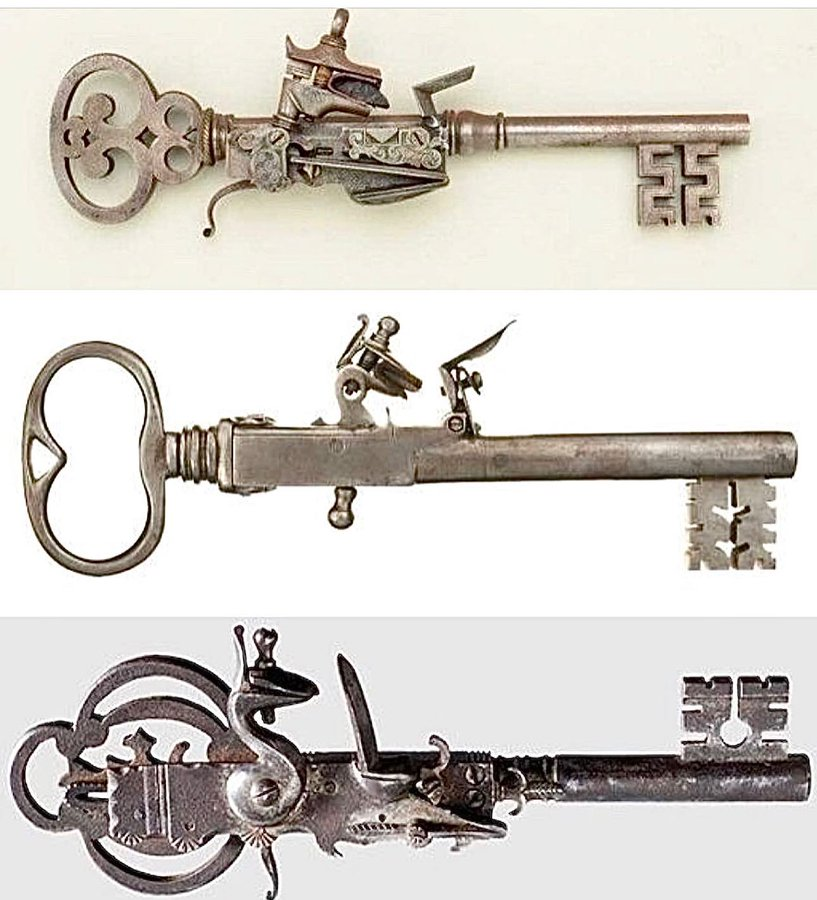Keys have always been a symbol of access and security, and their designs have evolved to meet the needs of the times. One of the most intriguing historical artifacts in this evolution is the flintlock key pistol. This unique blend of firearm and key represents a time when functionality, innovation, and intrigue combined to create an object of both utility and mystery.
Flintlock key pistols were ingeniously designed tools that served dual purposes: unlocking doors and serving as a concealed weapon. These artifacts date back to the 17th and 18th centuries and were primarily used by jailers and high-ranking officials who needed an extra layer of protection while performing their duties. The flintlock mechanism, typically associated with early firearms, was adapted to fit the handle of a large iron key, transforming it into a discreet weapon that could be used in times of peril.
The intricate designs of flintlock key pistols showcase the craftsmanship and ingenuity of their makers. Each key in the image exemplifies a combination of metalwork art and mechanical function. Here’s a closer look at the features of these fascinating objects:

Ornate Design: The keys are adorned with complex patterns and motifs, reflecting the artistic sensibilities of the era. These designs were not merely decorative but also indicated the status and wealth of the owner.
Flintlock Mechanism: The flintlock firing mechanism is cleverly integrated into the key’s structure. When the trigger is pulled, a piece of flint strikes a steel plate, producing a spark that ignites the gunpowder, firing the bullet. This makes the key a functioning firearm capable of discharging a small projectile.
Key Bow and Barrel: The bow of the key doubles as a handle for the pistol, providing a firm grip when the weapon is used. The barrel of the firearm is aligned with the key’s shaft, allowing it to be both a tool for unlocking and a concealed defensive weapon.
Dual Purpose: These key pistols were practical for jailers who might find themselves in dangerous situations. The key allowed them to open cell doors, while the pistol offered protection against potential threats from prisoners or intruders.
Flintlock key pistols are a testament to the period’s need for security and protection. They reflect an era when the lines between everyday tools and weapons were often blurred, leading to innovative designs that served multiple functions. These objects were not just tools but also symbols of power and authority, allowing those who possessed them to wield control over both access and security.
Today, flintlock key pistols are highly sought-after collectibles, prized for their historical significance and unique craftsmanship. They offer a glimpse into the past, where innovation and necessity drove the creation of multi-functional objects. Collectors and historians alike value these artifacts for their rarity and the stories they tell about the world in which they were used.
While no longer in use today, flintlock key pistols captivate the imagination of enthusiasts, historians, and collectors. They serve as a reminder of a time when personal security required ingenious solutions and when everyday items were often equipped with hidden functionalities. As historical artifacts, they continue to intrigue and inspire, reflecting the creativity and resourcefulness of their creators.
Flintlock key pistols are more than just relics of the past; they are a window into the minds of inventors who sought to provide safety and functionality in a single object. These fascinating tools, with their dual roles as keys and weapons, remain a captivating chapter in the history of security and innovation, symbolizing a time when ingenuity was the key to both access and protection.


